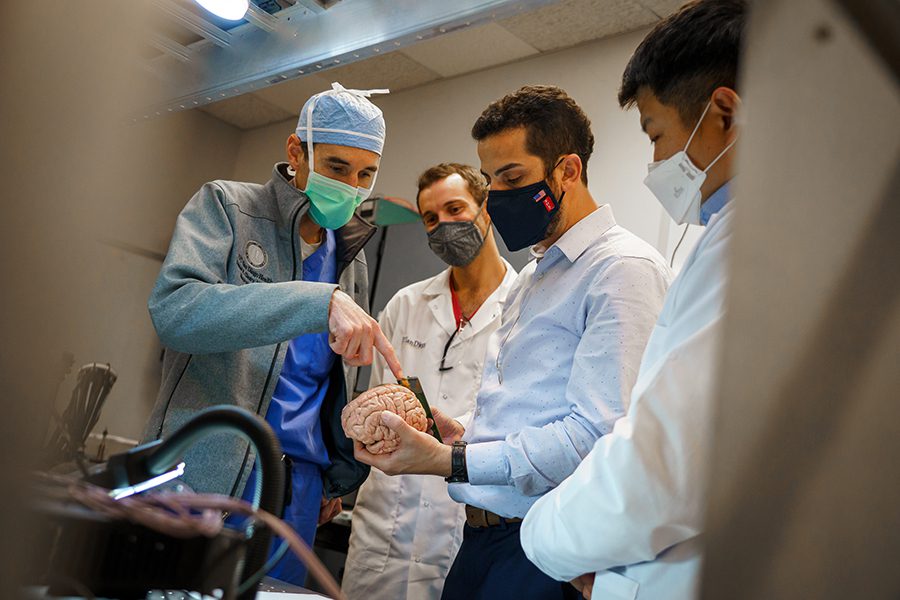Clear MRI but Neurological Symptoms: Are you or someone you know experiencing persistent symptoms despite having a clear MRI? It can be a frustrating and confusing situation, leaving you searching for answers. In this deep dive into neurological conditions, we will explore the perplexing world of symptoms that persist even when the MRI results are normal. These symptoms can significantly impact your quality of life, from chronic pain and fatigue to cognitive difficulties and sensory disturbances.
Together, we will unravel the mysteries behind these conditions, shedding light on the underlying causes and potential treatment options. Whether you are a healthcare professional seeking to better understand these complex cases or an individual desperate for answers, this exploration into neurological conditions will provide valuable insights and empower you to make informed decisions. Join us on this journey as we delve into the fascinating realm of the brain and unravel the enigma of symptoms that refuse to subside.
Common neurological conditions
Neurological conditions can manifest in a variety of ways, affecting different parts of the nervous system. Some of the most common neurological conditions include Migraines, Fibromyalgia, Multiple Sclerosis, Conversion Disorder, and Chronic Fatigue Syndrome. These conditions can cause a wide range of symptoms, from pain and fatigue to cognitive difficulties and sensory disturbances.
Symptoms and diagnostic challenges
One of the biggest challenges in diagnosing neurological conditions is that the symptoms can be vague and non-specific. Patients may experience a combination of symptoms that are difficult to attribute to a single condition. Additionally, these symptoms can fluctuate in severity, making it even more challenging to pinpoint the underlying cause.
Understanding the limitations of MRI
MRI (Magnetic Resonance Imaging) is a powerful diagnostic tool that uses magnetic fields and radio waves to produce detailed images of the brain and other parts of the body. While MRI can detect structural abnormalities, it has limitations when it comes to identifying functional or microscopic changes in the brain. This means that even if the MRI results are clear, there may still be underlying issues that are causing the persistent symptoms.
You May Like- How to Reduce Face Fat: Tips and Tricks to Slim Your Face Naturally
Factors Influencing MRI Results
Several factors can contribute to clear MRI results despite the presence of neurological symptoms. These factors include:
- Timing of the MRI: Some conditions may cause intermittent symptoms that may not be present at the time of the scan.
- Imaging techniques: Different MRI sequences may be more effective at detecting certain abnormalities than others.
- Resolution and sensitivity: The resolution and sensitivity of the MRI equipment can vary, potentially affecting the visibility of subtle abnormalities.
- Individual differences: Brain structures and functions can vary among individuals, making it challenging to detect specific abnormalities.
Other Diagnostic Tools for Neurological Conditions
When the MRI results are inconclusive, neurologists may turn to other diagnostic tools to further investigate the cause of the symptoms. These tools can include blood tests, electroencephalograms (EEGs), and nerve conduction studies. These tests can provide additional insights into the functioning of the nervous system and help narrow down the potential causes of the symptoms.

Misdiagnosis and the Impact on Patients
Misdiagnosis is unfortunately common in cases where the MRI results are clear but the symptoms persist. Patients may be labeled as having a “functional” or “psychological” condition, leading to delays in appropriate treatment and a sense of frustration and hopelessness. It is crucial for healthcare professionals to approach these cases with an open mind and consider all possible explanations for the persistent symptoms.
Exploring Alternative Explanations for Persistent Symptoms
When the MRI is clear but the symptoms persist, it is important to consider alternative explanations beyond neurological conditions. For example, certain autoimmune disorders, hormonal imbalances, and even psychological factors can manifest with symptoms similar to those seen in neurological conditions. A comprehensive evaluation that takes into account all potential underlying causes is necessary to provide the best possible care for patients.
Psychological Factors and Somatization
Psychological factors, such as stress, anxiety, or depression, can influence the perception and experience of physical symptoms. Somatization is a phenomenon in which psychological distress manifests as physical symptoms. In some cases, individuals may experience neurological symptoms that are primarily driven by psychological factors rather than underlying structural abnormalities.
The Role of Neurologists in Diagnosing Complex Cases
Neurologists play a crucial role in diagnosing complex cases where the symptoms persist despite clear MRI results. They have the expertise to recognize patterns, conduct thorough evaluations, and consider a wide range of possible causes. By working closely with patients and utilizing their knowledge of the nervous system, neurologists can help uncover the underlying causes of the persistent symptoms and guide patients towards appropriate treatment options.
Seeking Multidisciplinary Care
Given the complexity of neurological symptoms with clear MRI results, seeking multidisciplinary care can be beneficial. Collaborating with neurologists, psychiatrists, psychologists, and other healthcare professionals can help provide a comprehensive assessment and develop an appropriate treatment plan.
Treatment Options for Neurological conditions
The treatment of neurological conditions can vary depending on the specific condition and the individual patient. It often involves a multifaceted approach that may include medication, physical therapy, cognitive behavioral therapy, and lifestyle modifications. In some cases, experimental treatments or clinical trials may be considered. It is important for patients to work closely with their healthcare team to develop a personalized treatment plan that addresses their unique symptoms and needs.
Coping Strategies for Patients With Persistent Symptoms
Living with persistent symptoms can be challenging, both physically and emotionally. It is important for patients to develop coping strategies to manage their symptoms and improve their quality of life. These strategies can include stress management techniques, mindfulness practices, support groups, and self-care activities. It is also crucial for patients to advocate for themselves and seek out healthcare professionals who are knowledgeable about their specific condition.
Read More-9 Cluster Headache Home Remedy: Should Try At Home
Support and Resources for Individuals With Neurological Conditions
For individuals living with persistent symptoms, finding support and reliable resources is essential. There are numerous organizations and online communities dedicated to specific neurological conditions, providing a wealth of information, support, and opportunities for connection. These resources can help individuals navigate their condition, access the latest research, and connect with others who are going through similar experiences.
Future Directions in Diagnosis
Advancements in medical technology and research continue to expand our understanding of neurological conditions. Future diagnostic approaches may involve a combination of imaging techniques, biomarker analysis, genetic testing, and more advanced neuroimaging methods. These developments aim to improve the detection and diagnosis of conditions that currently present with clear MRI results but persistent neurological symptoms.
Conclusion
When the MRI is clear but the symptoms persist, it can be a frustrating and confusing experience. However, by exploring the complexities of neurological conditions and considering alternative explanations, we can begin to unravel the mysteries behind these persistent symptoms. It is crucial for healthcare professionals to approach these cases with an open mind, utilizing a range of diagnostic tools and considering all potential causes. By working together, we can empower individuals to take control of their health, find answers, and improve their quality of life. So, let’s continue on this journey of discovery and shed light on the enigma of symptoms that refuse to subside.
FAQs
Q: Can an MRI miss a brain tumor?
A: While MRI is highly effective in detecting brain tumors, there are rare cases where the tumor may be missed, particularly if it is very small or located in a challenging area.
Q: Are neurological symptoms always a cause for concern?
A: Neurological symptoms should be evaluated by a healthcare professional to determine the underlying cause. While many symptoms are benign, some may indicate underlying conditions that require medical attention.
Q: Can stress or anxiety cause neurological symptoms?
A: Yes, stress and anxiety can manifest as neurological symptoms such as headaches, dizziness, or tingling sensations. It is important to consider both psychological and physical factors when evaluating symptoms.
Q: Can neurological symptoms be psychosomatic?
A: Yes, psychosomatic symptoms can manifest as neurological symptoms without an underlying organic cause. Psychological factors can influence the perception and experience of physical symptoms.
Q: What should I do if I have persistent neurological symptoms despite clear MRI results?
A: It is advisable to consult with a healthcare professional specializing in neurology or seek a second opinion. Exploring alternative diagnostic modalities and considering multidisciplinary care can help in identifying the underlying cause of your symptoms.
Q: Can a clear MRI rule out multiple sclerosis?
A: No, in some cases, early-stage multiple sclerosis may not cause visible changes on an MRI scan. Additional diagnostic tests may be necessary to confirm the diagnosis.
Q: How can functional MRI help in assessing neurological symptoms?
A: Functional MRI (fMRI) provides insights into brain activity and can detect abnormal patterns of brain function even when structural MRI appears normal. It can help in understanding the functional aspects of neurological symptoms.
Q: What other imaging techniques can be used if an MRI is clear?
A: Other imaging techniques that may be considered include positron emission tomography (PET), single-photon emission computed tomography (SPECT), or diffusion tensor imaging (DTI), depending on the suspected underlying condition.
Q: Are there any risks associated with an MRI scan?
A: MRI scans are generally considered safe and non-invasive. However, individuals with certain medical conditions or implanted devices may need to inform the healthcare provider before the scan to ensure safety.
Q: Is there a cure for conditions with clear MRI but neurological symptoms?
A: The treatment approach depends on the underlying cause of the symptoms. In some cases, managing symptoms and improving quality of life may be the primary focus, while in other cases, specific treatments targeting the cause may be available.


4 thoughts on “Clear MRI but Neurological Symptoms: Understanding Neurological Symptoms with a Clear MRI”